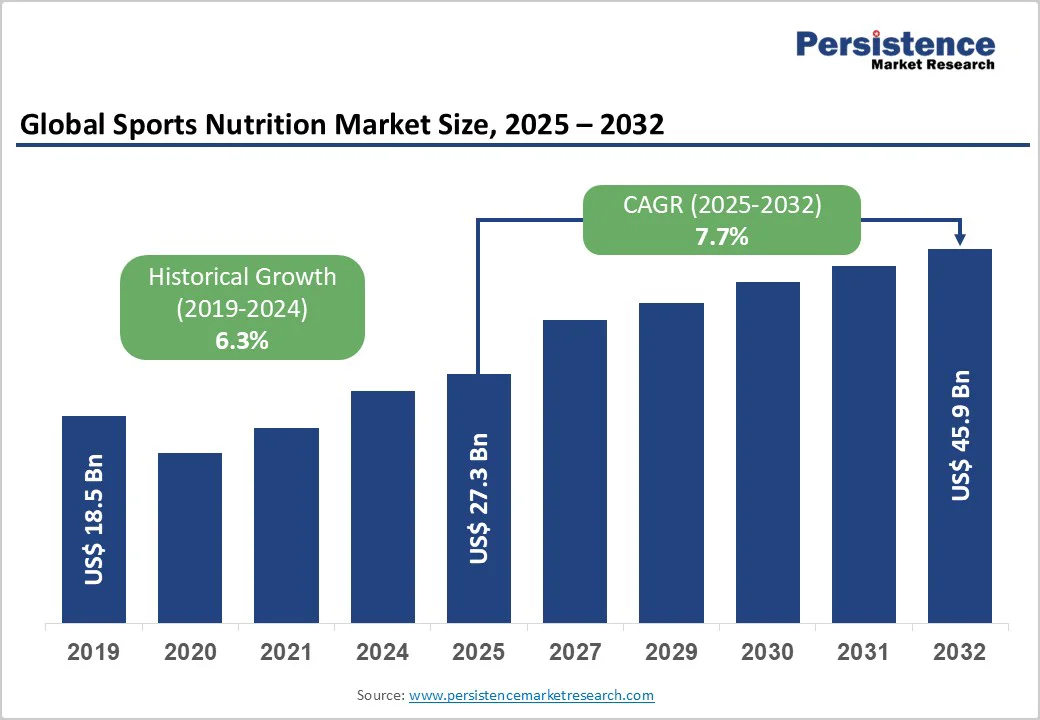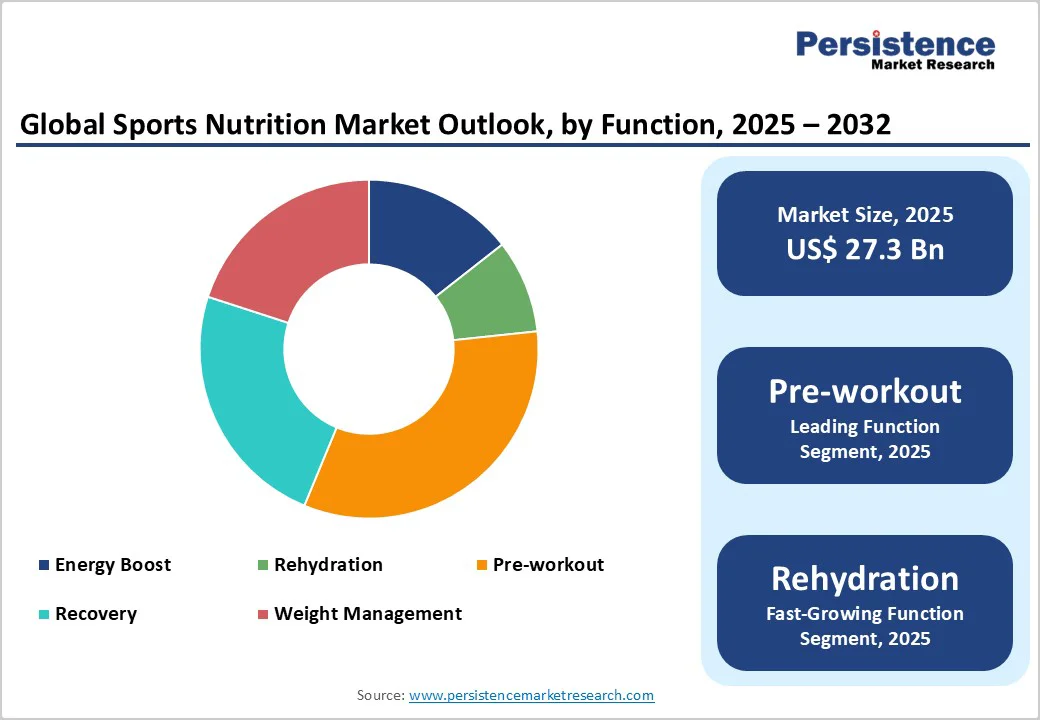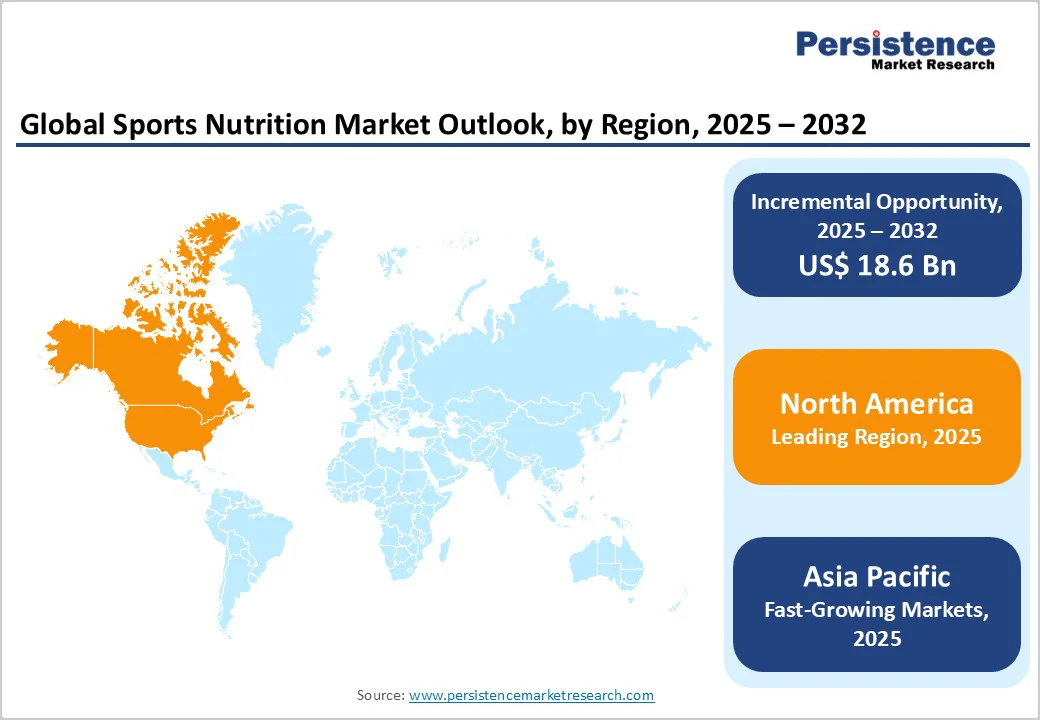ID: PMRREP2889| 200 Pages | 29 Oct 2025 | Format: PDF, Excel, PPT* | Food and Beverages

The global sports nutrition market is expected to reach US$27.3 billion in 2025 and US$45.9 billion by 2032, growing at a CAGR of 7.7% over the forecast period from 2025 to 2032.
| Key Insights | Details |
|---|---|
|
Global Sports Nutrition Market Size (2025E) |
US$27.3 Bn |
|
Market Value Forecast (2032F) |
US$45.9 Bn |
|
Projected Growth (CAGR 2025 to 2032) |
7.7% |
|
Historical Market Growth (CAGR 2019 to 2024) |
6.3% |

Rising participation in sports and fitness activities is a key driver of the global sports nutrition market, reflecting a broader societal shift toward health, wellness, and active living. Europe exemplifies this trend, with fitness center memberships reaching nearly 68 million in 2023 and revenues hitting €31.8 billion, surpassing pre-pandemic levels. The World Health Organization notes that adhering to 150 minutes of weekly exercise could prevent over 10,000 deaths annually in the EU and save €8 billion in healthcare costs. Projections indicate Europe will reach 100 million gym members by 2030. Concurrently, global health and fitness app downloads have surged over 2 billion in 2023, driven by digital engagement in personal training and nutrition tracking. This growing culture of physical activity is significantly boosting demand for innovative, high-performance sports nutrition products worldwide.
Regulatory complexity and inconsistent labeling standards pose a major restraint to the global sports nutrition market. Products such as protein powders, creatine, and amino acid supplements often fall into a regulatory grey area, classified differently across regions as foods, dietary supplements, or quasi-pharmaceuticals. These variations in permissible claims, ingredient disclosure, and daily intake guidelines create barriers to global expansion and confuse consumers. Smaller brands are particularly impacted, facing high costs for compliance, certifications, and legal approvals.
Inconsistent labeling also increases the risk of misbranding, product recalls, and erosion of consumer trust. As transparency and safety awareness rise, the lack of harmonized global standards continues to limit innovation, delay cross-border launches, and slow market growth, despite growing demand for trusted, science-backed sports nutrition solutions.
The rapidly growing esports market presents a significant opportunity for manufacturers to tap into the expanding demand for performance nutrition. According to the data published on Glanbia Nutritionals, nearly half a billion people are expected to watch esports events this year. The global esports audience is forecast to grow by another 11.7 percent, reaching 495 million viewers. As esports tournaments continue to gain mainstream attention, the need for specialized nutrition products that support gamers' performance is becoming increasingly vital. Serious gamers are constantly seeking a competitive edge, driving demand for science-based ingredients that enhance brain and eye health, energy, focus, and vision. Popular ingredients such as caffeine, taurine, and B vitamins help with energy, while L-theanine, Panax ginseng, and choline support focus.
Additionally, ingredients such as lutein and omega-3 fatty acids are crucial for visual health. As performance nutrition shifts towards sustained energy, low-sugar and sugar-free formulations with moderate caffeine levels are gaining popularity, addressing the need for long-lasting performance without the "crash" effect. These natural ingredients support cognitive performance, relaxation, and focus, appealing to gamers seeking holistic solutions.
Pre-workout holds approx 34% market share as of 2024, reflecting its strong position as the go-to segment for athletes and fitness enthusiasts seeking enhanced performance and endurance. These formulations are designed to optimize energy output, mental focus, and muscle readiness before intense physical activity. Pre-workout products typically contain ingredients such as caffeine, beta-alanine, creatine, and amino acids that help delay fatigue and maximize strength. They also support better rehydration and nutrient delivery during exercise, improving overall stamina and output. In addition, consumers view pre-workouts as an effective aid for recovery and weight management, as their thermogenic and metabolism-boosting effects help maintain lean muscle while promoting fat utilization. The segment’s versatility continues to attract both professional athletes and recreational users globally.
Natural flavors are projected to achieve a positive CAGR during the forecast period, driven by increasing consumer preference for clean-label, minimally processed, and plant-based ingredients in sports nutrition products. Health-conscious athletes and fitness enthusiasts are seeking products free from artificial additives, colors, and synthetic flavors, creating strong demand for natural flavor variants. These flavors enhance the sensory appeal of protein powders, energy bars, pre-workouts, and ready-to-drink beverages without compromising nutritional integrity.
Additionally, natural flavors align with trends in holistic wellness, supporting digestive comfort, allergen-friendly formulations, and functional benefits such as improved energy, recovery, and hydration. Manufacturers focusing on innovative natural flavor combinations can attract a broader consumer base, strengthen brand credibility, and capture market share as clean-label products continue to gain traction globally.

North America holds approximately 39% market share in the global sports nutrition market, reflecting strong consumer adoption of performance-enhancing supplements and wellness-focused products. In the U.S., demand is rising for plant-based protein powders, ready-to-drink shakes, and functional snacks that support energy, recovery, and muscle growth. Innovative formulations incorporating adaptogens, nootropics, and probiotics are gaining traction as consumers seek holistic benefits beyond traditional protein supplementation. In Canada, clean-label and allergen-friendly products are increasingly preferred, alongside sustainable packaging and ethically sourced ingredients. Digital engagement through fitness apps and online communities is shaping purchase behavior, while personalized nutrition solutions are emerging to cater to individual performance goals. Overall, North America’s market is evolving rapidly, driven by health-conscious lifestyles, technological integration, and an appetite for functional and convenient sports nutrition solutions.
The Asia Pacific Sports Nutrition Market is expected to grow at a CAGR of 10.8%, driven by rising health awareness, urbanization, and increasing participation in fitness and sports activities. In India, demand for protein supplements, energy bars, and fortified beverages is surging among gym-goers and young athletes seeking muscle-building and endurance support. China is witnessing growing adoption of ready-to-drink sports nutrition products and functional powders, driven by expanding fitness club membership and e-commerce penetration. Japan’s market trends highlight a shift toward low-sugar, plant-based, and functional supplements targeting aging populations and wellness-conscious consumers.
Across the region, consumers increasingly prefer clean-label, natural, and sustainable products, while digital fitness platforms and personalized nutrition solutions are shaping purchase decisions, making Asia Pacific a high-growth, innovation-driven sports nutrition market.

The global sports nutrition market is highly competitive and moderately consolidated, with leading players establishing strong brand presence through product innovation, strategic partnerships, and geographic expansion. Major companies focus on developing advanced formulations, including protein blends, pre-workouts, and functional supplements targeting energy, recovery, and cognitive performance. Startups are driving innovation with niche offerings such as plant-based proteins, nootropic-infused products, and personalized nutrition solutions.
Marketing strategies increasingly leverage influencer collaborations, social media campaigns, and digital fitness platforms to engage younger, health-conscious consumers. Clean-label ingredients, sustainable packaging, and convenient formats like ready-to-drink shakes and bars are gaining prominence. Companies integrating innovation, targeted marketing, and transparency in ingredients are positioning themselves to capture loyal consumer bases and strengthen their competitive edge in this rapidly evolving global market.
The global sports nutrition market is projected to be valued at US$27.3 Bn in 2025.
Rising participation in sports and fitness activities is driving the global sports nutrition market.
The Global Sports Nutrition market is poised to witness a CAGR of 7.7% between 2025 and 2032.
Tapping into the esports market with innovative nootropic products is the key market opportunity.
Major players in the Global Sports Nutrition market include Nestlé S.A., Glanbia PLC, Herbalife International, Inc., Amway, THG Nutrition Limited, Mondelēz International, and others.
|
Report Attribute |
Details |
|
Historical Data/Actuals |
2019 - 2024 |
|
Forecast Period |
2025 - 2032 |
|
Market Analysis |
Value: US$ Bn |
|
Geographical Coverage |
|
|
Segmental Coverage |
|
|
Competitive Analysis |
|
|
Report Highlights |
|
By Function
By Form
By Flavor
By Micronutrients
By Sales Channel
By Region
Delivery Timelines
For more information on this report and its delivery timelines please get in touch with our sales team.
About Author